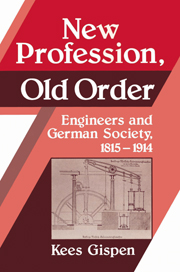Book contents
- Frontmatter
- Contents
- List of tables
- List of figures
- Preface
- Abbreviations
- Introduction
- Part I Emulation: Bildung and the bureaucratic order
- 1 Technical education and society before 1850
- 2 Nationalism, industrialization, and technology: the first years of the Verein Deutscher Ingenieure
- 3 The pursuit of Bildung: Grashof and the VDI, 1856–1876
- 4 The reform of technical education in Prussia, 1876–1879
- Part II Reorientation: industrial capitalism and a “practical” profession
- Part III The crucible: technical careers and managerial power, 1900–1914
- Epilogue
- Appendix
- Bibliographical note
- Index
4 - The reform of technical education in Prussia, 1876–1879
Published online by Cambridge University Press: 11 September 2009
- Frontmatter
- Contents
- List of tables
- List of figures
- Preface
- Abbreviations
- Introduction
- Part I Emulation: Bildung and the bureaucratic order
- 1 Technical education and society before 1850
- 2 Nationalism, industrialization, and technology: the first years of the Verein Deutscher Ingenieure
- 3 The pursuit of Bildung: Grashof and the VDI, 1856–1876
- 4 The reform of technical education in Prussia, 1876–1879
- Part II Reorientation: industrial capitalism and a “practical” profession
- Part III The crucible: technical careers and managerial power, 1900–1914
- Epilogue
- Appendix
- Bibliographical note
- Index
Summary
Grashof had given his 1876 address at a time when the problems of the engineers were first emerging as issues of broader public concern. One reason for this was the stepped-up agitation for educational reform by the engineering professorate. During the 1870s, numerous educators at the polytechnical schools spoke up to demand the liberation of engineering science from its stigma of narrow specialization, insisting it be based firmly on either the Gymnasium or the nine-year Realschule with Latin. They called for a merger of the Industrial Institute and the Bau-Akademie or even the integration of higher technical education and the universities. The loudest and most effective agitation for reform, however, came not from this direction but from disgruntled junior members of Prussia's corps of civil engineers and architects. The reorganization of Prussian technical education in the late 1870s resulted primarily from this group's public exposure of backwardness and growing professional incompetence in the engineering corps.
All this took place against the background of the economic depression 1873–9. The postcrash atmosphere did not influence reform directly, as it would the events described in Part II of this study. To all appearances, issues of status, assimilation with the established professions, and concern with Bildung remained dominant. Underneath the surface, however, one detects important shifts in the meanings of these terms and in the ambitions of the parties involved. That, in turn, set the stage for what came after.
- Type
- Chapter
- Information
- New Profession, Old OrderEngineers and German Society, 1815–1914, pp. 86 - 110Publisher: Cambridge University PressPrint publication year: 1990

